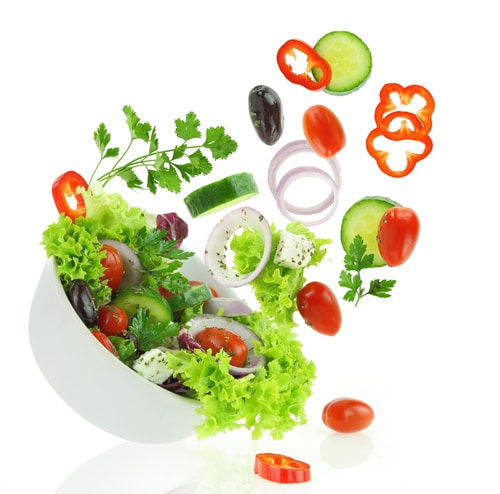
How Your Intestines Absorb Nutrients
You absorb most of the nutrients in your diet through your small intestines. Nutrients from the foods you eat have to be taken up by intestinal cells. From the intestinal cells, they enter the bloodstream. This assumes everything is structurally intact and nothing interferes with absorption. People who have diseases affecting their intestinal tract like Celiac disease or inflammatory bowel disease have problems absorbing nutrients from the food they eat. Even the bacteria that live in your small intestines have an impact on the absorption of some nutrients, especially minerals. Taking antibiotics for an infection destroys gut-friendly bacteria and may reduce mineral absorption.
Other medications affect nutrient absorption as well. Some do it by changing the pH or acid-base balance of your intestinal tract. Calcium is best absorbed in an acidic environment. Some drugs used to treat digestive problems like acid reflux raise the pH of the digestive tract, making it more basic. This reduces calcium absorption. This can also happen if you don’t produce enough stomach acid, a problem that becomes more common with age. You also need an acid pH to absorb iron.
Medications can affect the absorption of vitamins too. A drug called metformin used to treat type 2 diabetes reduces absorption of vitamin B12 to the point that a deficiency occurs in some people. Other medications that can reduce vitamin or minerals in your body include some cholesterol-lowering medications, diuretics, medications used to treat seizures and oral contraceptives.
What You Eat with What Matters Too
If you’re eating an iron-rich food and want to absorb as much iron as possible, eat it with citrus fruit or other food high in vitamin C. Vitamin C increases the absorption of iron. What you don’t want to do is drink milk, tea or coffee. Milk, dairy foods, coffee, and tea interfere with iron absorption.
What about fiber? Some research suggests that fiber blocks the absorption of some minerals, especially calcium, by forming complexes with it. Other studies fail to show that fiber significantly impacts mineral absorption. Many high-fiber foods like whole grains are a good source of minerals like iron and magnesium. If you’re eating a lot of mineral-rich foods, you’re getting enough minerals to compensate and shouldn’t be concerned about a deficiency.
Nutrient Absorption Is Self-Regulated
Your body has a remarkable ability to regulate itself. When stores of a particular mineral fall, your body increases absorption of that particular mineral to restore balance. When it has enough of a certain mineral, less will be absorbed. Your body has the ability to tap into minerals on an “as needed” basis to some degree.
Minerals Can Interfere with the Absorption of Each Other
Iron, zinc, calcium, magnesium, and copper compete with one another for absorption. Get too much of one mineral and you may absorb less of the others. That’s why it’s not a good idea to supplement with a single mineral unless you have a known deficiency. For example, supplementing zinc without copper can lead to copper deficiency. There are cases of people developing a copper deficiency after using a denture adhesive that contains zinc over a long period of time. Zinc blocks copper absorption.
It’s all about balance when it comes to getting your minerals. The best way to maintain balance is to eat a variety of whole, mineral-rich foods including vegetables, fruits, and whole grains.
Fat-Soluble Vitamins Need Fat for Absorption
Vitamins A, D, E, and K need fat for proper absorption because they’re fat-soluble vitamins. Carotenoids in fruits and vegetables also need a fatty environment to be absorbed by your intestinal tract. If you don’t add a source of fat to a salad, you may miss out on some of the carotenoids in the veggies. Make it easier to absorb those carotenoids by using an olive oil-based dressing on your next salad.
Cooking Destroys Some Vitamins
When you cook vegetables, you get some vitamin loss, especially if you use lots of water when preparing them. Vitamin C is heat unstable. If you boil a veggie you lose a significant amount of the vitamin C. You lose less when you steam or microwave it. Cooking some vegetables may actually enhance mineral absorption. Cooking reduces oxalates, compounds that block mineral absorption. Spinach is an example of a vegetable high in oxalates.
The Bottom Line?
When you read that a food has a certain amount of a vitamin or mineral, don’t assume you’re getting it all. A number of factors from how you prepare food to what you eat it with can affect how much your body gets access to. So, make sure you’re eating lots of vitamin and mineral-rich whole foods to maximize your health.
References:
J Nutr. 2007 Mar;137(3 Suppl 2):838S-46S.
Age Ageing (March 2006) 35 (2): 200-201.
Br Dent J. 2011 Jun 10;210(11):523-5.
Nutrition & Food Science, Vol. 43 Iss: 5, pp.438 – 443.
Related Articles By Cathe:
5 Factors That Affect Nutrient Absorption From Your Diet
6 Foods You Should Always Cook
5 Ways to Boost Dietary Calcium Absorption
5 Common Myths about Vitamins We Should All Stop Believing
Do You Need a Mineral Supplement if You Work Out?
6 Nutritional Hacks to Get More Nutrients from the Food You Eat
Do Micronutrient Deficiencies Increase the Risk of Cancer?

